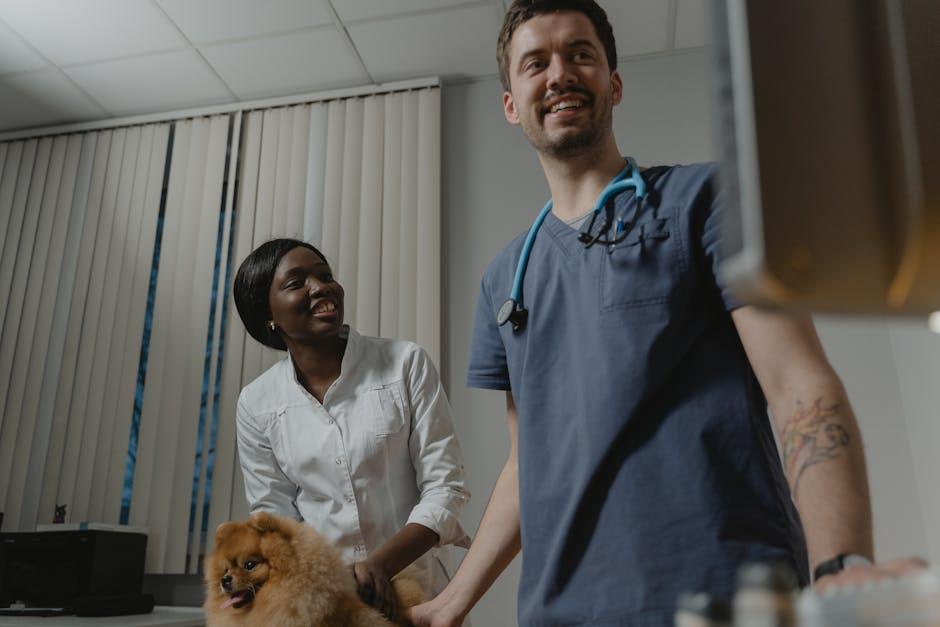In the twilight years of our beloved pets, every wag of the tail and gentle purr carries a deeper significance. As pet owners, we naturally strive to provide them with the best care possible. Yet, amidst the flurry of vet visits and medical advice, a curious question emerges: Are veterinarians over-diagnosing chronic conditions in senior pets to promote treatments? This delicate topic invites us to explore the intricate balance between genuine concern and the potential for overzealous medical intervention. Join us as we delve into this issue with warmth and empathy, seeking to understand the motivations and implications behind the diagnoses that shape the golden years of our furry companions.
Understanding the Diagnosis Dilemma: Navigating Senior Pet Health
As our beloved pets age, their healthcare needs become more complex, often leading to an intricate dance between diagnosis and treatment. It’s natural for pet owners to wonder if their senior pets are being over-diagnosed with chronic conditions. After all, the signs of aging—such as reduced mobility or changes in appetite—can mimic symptoms of various ailments. This overlap sometimes leads to an array of diagnostic tests and treatment plans that can feel overwhelming.
While it’s important to stay vigilant about our pets’ health, we should also be aware of the nuances involved. Here are a few considerations to keep in mind:
- Age vs. Illness: Recognize the difference between normal aging and genuine health issues. Not every change in behavior or physical condition signals a serious problem.
- Second Opinions: Don’t hesitate to seek a second opinion if a diagnosis feels uncertain. Different veterinarians may offer alternative perspectives or treatment options.
- Holistic Approaches: Consider integrative therapies that focus on overall wellness, potentially reducing the need for aggressive treatments.
Empowering yourself with knowledge and understanding your pet’s specific needs can make the journey through their senior years a rewarding experience for both of you.

Decoding Veterinary Intentions: Trust, Care, and Communication
When it comes to our beloved senior pets, the relationship with veterinarians becomes even more crucial. Trust forms the foundation of this bond, allowing pet owners to feel confident in the care provided. Veterinarians often face the delicate task of balancing genuine concern with the need for effective communication. It’s not just about identifying symptoms; it’s about understanding the pet’s history, lifestyle, and the subtle cues that might indicate more than meets the eye.
Care for senior pets involves navigating a landscape of potential chronic conditions. Some may wonder if this leads to over-diagnosis. However, a seasoned vet knows that each diagnosis is a piece of a larger puzzle. Effective communication is key, ensuring that pet owners understand the rationale behind recommendations. Here’s what you should expect from your vet:
- Transparency: Clear explanations about diagnoses and treatment options.
- Empathy: A genuine concern for the pet’s well-being.
- Collaboration: Involving pet owners in decision-making processes.
By fostering an environment of trust and open dialogue, veterinarians aim to provide the best possible care, ensuring our senior companions enjoy their golden years to the fullest.

Holistic Approaches: Embracing Alternative Therapies for Aging Pets
As pet parents, watching our furry companions age gracefully is a journey filled with love and care. In recent years, there’s been a growing interest in holistic approaches to support the well-being of senior pets. These methods offer a more comprehensive way to address the complexities of aging, going beyond conventional treatments.
Alternative therapies can include a variety of practices such as:
- Acupuncture: This ancient technique can help manage pain and improve mobility.
- Herbal Remedies: Natural supplements may boost immune function and overall vitality.
- Massage Therapy: Gentle touch can enhance circulation and provide comfort.
- Dietary Adjustments: Tailored nutrition plans can address specific health needs.
These approaches not only focus on the physical aspects but also nurture the emotional and spiritual health of pets, creating a balanced path to aging. By embracing these therapies, we can offer a gentle and loving way to support our senior pets, ensuring their golden years are filled with joy and serenity.

Empowering Pet Owners: Making Informed Decisions for Your Furry Friend
As a pet owner, it’s natural to be concerned about the health of your aging companions. However, recent discussions have sparked curiosity about whether veterinarians are over-diagnosing senior pets with chronic conditions to promote treatments. It’s essential to approach this topic with a balanced perspective, ensuring that the well-being of your furry friend remains the priority.
Here are some ways to empower yourself in making informed decisions:
- Ask Questions: Don’t hesitate to inquire about the necessity of tests and treatments. Understanding the purpose can help you make informed choices.
- Seek a Second Opinion: If a diagnosis feels uncertain, consider consulting another vet to explore alternative viewpoints.
- Research and Educate: Familiarize yourself with common conditions in senior pets. Knowledge is a powerful tool in assessing the need for interventions.
- Trust Your Instincts: You know your pet best. If something doesn’t feel right, trust your gut and seek further clarification.
By taking these steps, you can ensure that decisions regarding your pet’s health are made with care and confidence.


































